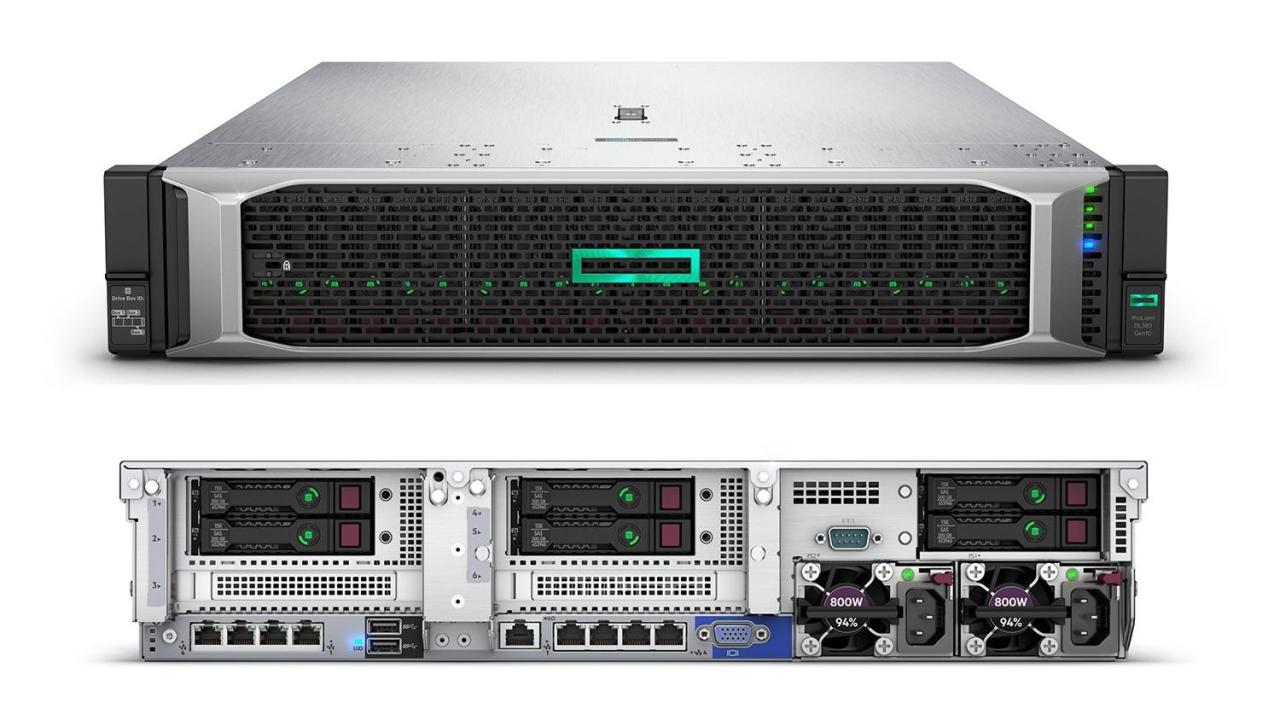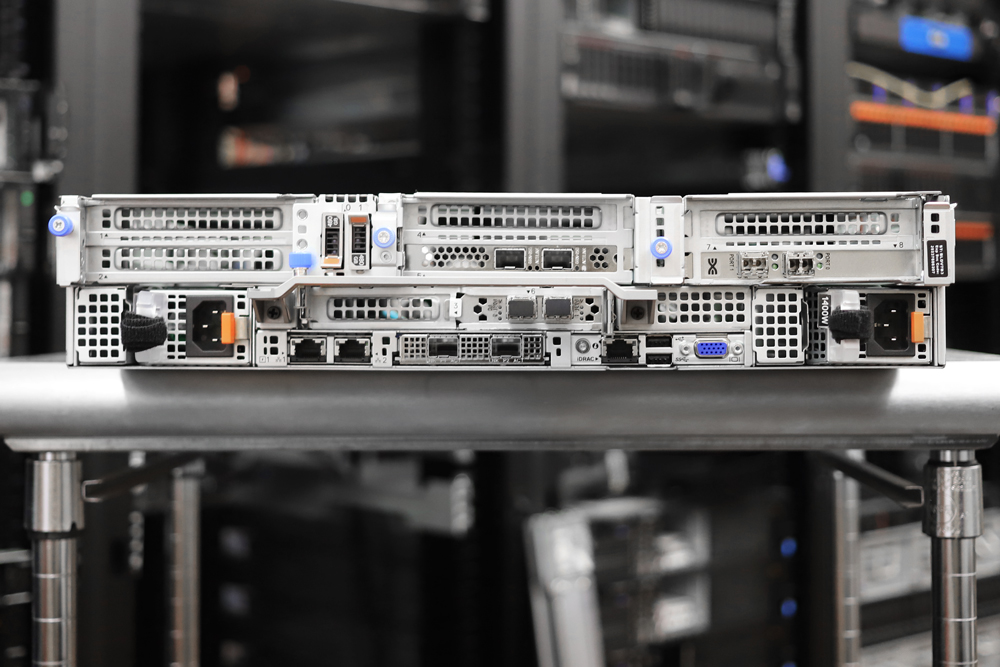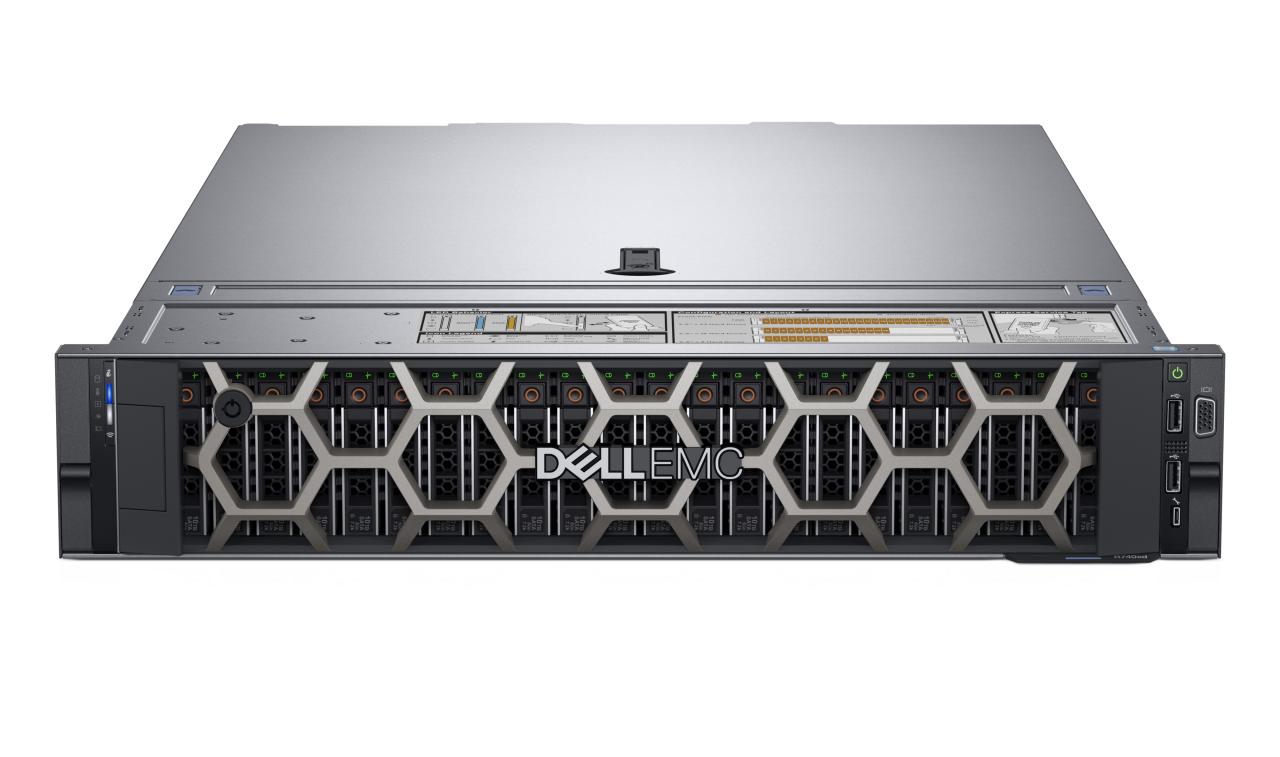Dell R640, a powerhouse server designed for demanding workloads, offers a compelling blend of performance, scalability, and reliability. This server is a cornerstone for businesses seeking to optimize their IT infrastructure, handling critical applications with ease. From cloud computing and data storage to high-performance computing and virtualization, the Dell R640 stands ready to meet the challenges of today’s digital landscape.
The Dell R640 server boasts a robust architecture, featuring powerful Intel Xeon processors, ample memory capacity, and versatile storage options. Its advanced features, including the integrated Dell Remote Access Controller (iDRAC), provide comprehensive management and monitoring capabilities. The Dell R640 is a flexible solution that can be tailored to specific needs, making it an ideal choice for businesses of all sizes.
Dell R640 Overview
The Dell R640 is a powerful and versatile 2U rack server designed to meet the demanding needs of modern businesses. It offers a comprehensive range of features and specifications, making it suitable for a wide variety of applications, from general-purpose workloads to mission-critical deployments.
Key Features and Specifications
The Dell R640 boasts a robust set of features and specifications, including:
- Processors: Supports up to two Intel Xeon Scalable processors, offering exceptional processing power for demanding workloads.
- Memory: Supports up to 24 DDR4 DIMMs, providing ample memory capacity for large datasets and complex applications.
- Storage: Offers a variety of storage options, including SAS, SATA, and NVMe drives, allowing for flexible storage configurations based on specific requirements.
- Networking: Equipped with multiple network interfaces, including 10/25 Gigabit Ethernet, enabling high-speed connectivity for demanding applications.
- Expansion: Features multiple PCIe slots for adding additional I/O cards, providing flexibility for customized configurations.
- Management: Offers advanced management capabilities, including Dell OpenManage, for simplified server administration and monitoring.
Target Audience and Use Cases
The Dell R640 is a versatile server that caters to a wide range of audiences and use cases. It is ideal for businesses of all sizes, including:
- Enterprises: For mission-critical applications, high-performance computing, and large-scale data processing.
- Small and Medium Businesses (SMBs): For virtualization, cloud computing, and general-purpose workloads.
- Service Providers: For hosting services, web servers, and database management.
- Research Institutions: For scientific simulations, data analysis, and high-performance computing.
Benefits of Choosing the Dell R640
Choosing the Dell R640 for specific applications offers several advantages:
- Performance: The server’s powerful processors and ample memory capacity deliver exceptional performance for demanding workloads, ensuring efficient processing and rapid execution of applications.
- Scalability: The Dell R640 is designed for scalability, allowing for easy expansion of resources to meet future growth needs. This includes the ability to add more processors, memory, storage, and network interfaces as required.
- Reliability: Dell servers are known for their reliability and durability, ensuring consistent performance and uptime for critical applications. The R640 incorporates advanced features for data protection and fault tolerance, minimizing downtime and data loss.
- Management: The server’s comprehensive management capabilities, including Dell OpenManage, simplify server administration and monitoring, reducing operational overhead and enabling efficient resource utilization.
- Security: Dell servers offer robust security features, including hardware-based security measures and advanced software protection, ensuring data integrity and confidentiality.
Technical Specifications and Components: Dell R640
The Dell R640 is a powerful and versatile server that offers a wide range of technical specifications and components to meet the needs of various businesses. This section delves into the key aspects of the R640’s technical makeup, including its processor options, memory configurations, storage capabilities, network connectivity options, expansion slots, and the integrated management controller (iDRAC).
Processor Options
The Dell R640 supports a variety of Intel Xeon processors, offering scalability and performance to accommodate diverse workloads.
- The server supports up to two Intel Xeon Processor E5-2600 v4 series processors, providing a maximum of 22 cores per processor.
- These processors offer a range of clock speeds and cache sizes, allowing users to choose the optimal configuration for their specific requirements.
Memory Configurations
The Dell R640 offers flexible memory configurations to support demanding applications and large datasets.
- The server supports up to 24 DIMM slots, enabling a maximum memory capacity of 3 TB of DDR4 RDIMM or LRDIMM.
- The memory configurations can be tailored to suit the specific needs of the application, ensuring optimal performance and efficiency.
Storage Capabilities
The Dell R640 provides extensive storage options, including both local and remote storage solutions, to meet diverse data storage needs.
- The server offers up to 24 SFF (Small Form Factor) or 8 LFF (Large Form Factor) drive bays, providing ample space for hard disk drives (HDDs) or solid-state drives (SSDs).
- The R640 supports various RAID configurations, allowing users to optimize storage performance and data protection.
- The server also supports SAS (Serial Attached SCSI) and SATA (Serial ATA) interfaces, enabling compatibility with a wide range of storage devices.
- Furthermore, the R640 can be integrated into a storage area network (SAN) or network-attached storage (NAS) solution, providing centralized data storage and management.
Network Connectivity Options
The Dell R640 offers a variety of network connectivity options, ensuring seamless integration into existing network infrastructures.
- The server features up to four built-in Gigabit Ethernet ports, providing high-speed network connectivity for local area networks (LANs).
- The R640 also supports optional 10 Gigabit Ethernet adapters, enabling faster data transfer rates and increased network bandwidth.
- Additionally, the server supports Fibre Channel adapters, providing high-speed connectivity for storage area networks (SANs).
Expansion Slots
The Dell R640 provides ample expansion slots to accommodate additional components and peripherals, allowing users to customize the server to meet specific needs.
- The server features multiple PCIe (Peripheral Component Interconnect Express) slots, enabling the addition of high-performance network adapters, graphics cards, or other specialized hardware.
- The R640 also includes a dedicated slot for an optional iDRAC (Integrated Dell Remote Access Controller) module, providing remote server management capabilities.
Integrated Management Controller (iDRAC)
The iDRAC is a powerful integrated management controller that provides remote server management capabilities, simplifying administration and enhancing server availability.
- The iDRAC offers a web-based interface for monitoring server health, managing system settings, and performing remote tasks.
- It supports features such as remote power management, virtual media, and out-of-band management, allowing administrators to manage the server even when the operating system is unavailable.
- The iDRAC also includes advanced security features, such as secure boot and encryption, to protect the server from unauthorized access.
Performance and Scalability
The Dell R640 is a powerful server designed to handle demanding workloads. Its performance and scalability are key factors in its appeal for businesses of all sizes.
Performance Comparison
The Dell R640’s performance can be compared to other servers in its class based on factors like processor speed, memory capacity, and storage options. The R640 excels in several areas, including:
* Processor Power: The R640 supports Intel Xeon Scalable processors with up to 28 cores per processor. This high core count provides significant processing power for demanding applications like virtualization, database management, and high-performance computing.
* Memory Capacity: The R640 supports up to 3.84TB of DDR4 RDIMM memory, enabling it to handle large datasets and complex workloads. This memory capacity allows for efficient multitasking and rapid data processing.
* Storage Flexibility: The R640 offers a variety of storage options, including SAS, SATA, and NVMe drives. This flexibility allows users to optimize storage performance based on their specific needs.
Scalability Options
The Dell R640 offers a range of scalability options to meet evolving business needs:
* Processor Upgrades: The R640 supports multiple processor configurations, allowing users to upgrade to more powerful processors as their needs change. This allows for increased processing power and performance as the workload demands grow.
* Memory Expansion: The R640’s memory capacity can be expanded up to 3.84TB, providing ample room for growth. This allows users to accommodate increasing data demands and complex applications without compromising performance.
Impact of Configuration
Different configurations of the Dell R640 have a significant impact on its overall performance and resource utilization:
* Processor Configuration: A higher core count processor configuration provides more processing power for demanding applications. However, it also increases power consumption and heat generation.
* Memory Configuration: A larger memory configuration allows for handling larger datasets and complex applications. However, it also increases the cost of the server.
* Storage Configuration: Choosing the right storage options, such as NVMe drives for faster access speeds or SAS drives for high capacity, can significantly impact overall performance and data availability.
Key takeaway: The Dell R640’s performance and scalability are highly customizable based on specific needs. By carefully choosing the right processor, memory, and storage configurations, users can optimize the server’s performance for their specific workload.
Management and Administration
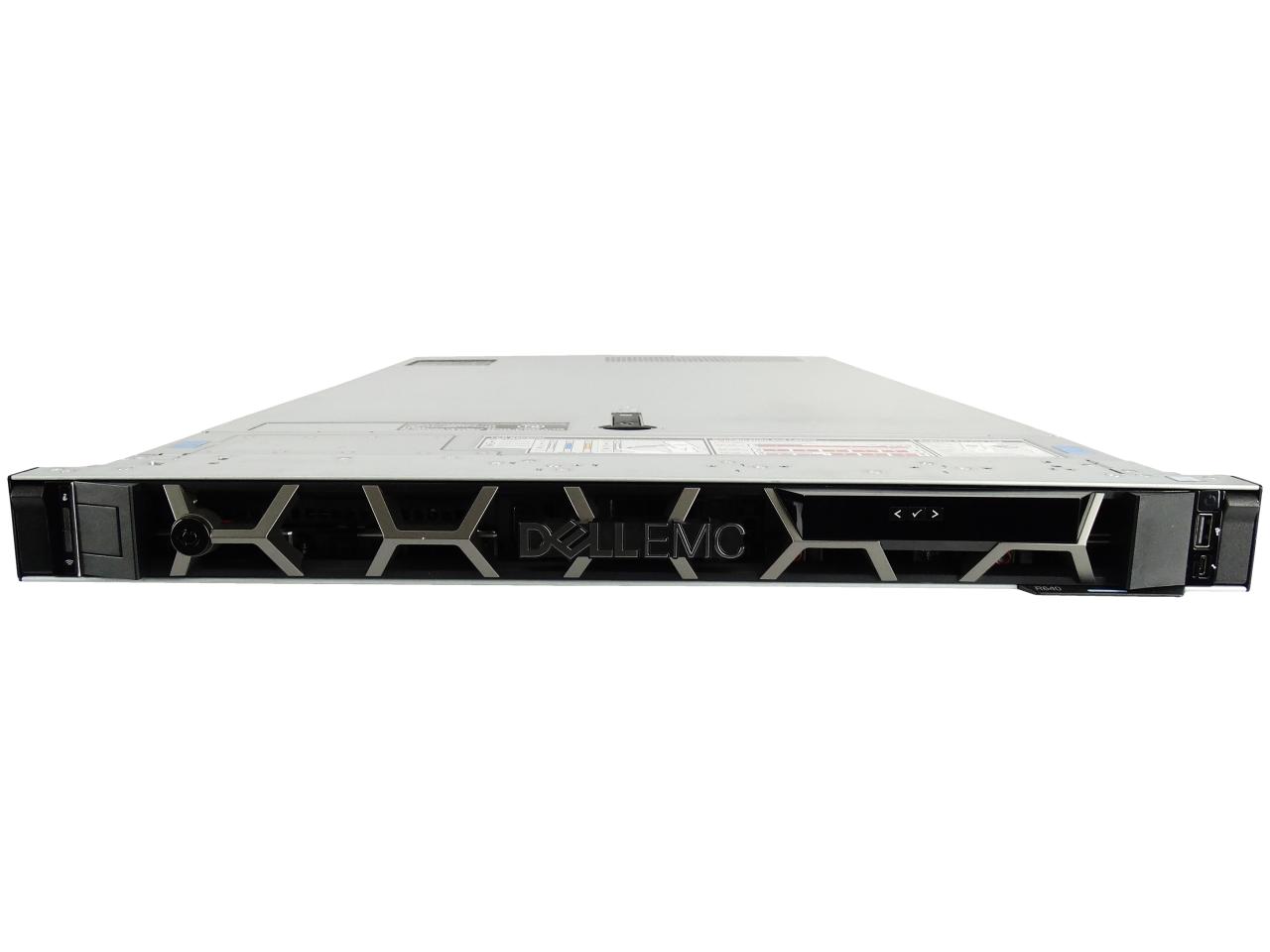
The Dell R640 server is designed with a comprehensive suite of management tools and features that simplify administration and provide enhanced control over the server’s operations. These tools enable you to monitor, configure, and manage the server remotely, ensuring high availability and optimal performance.
Remote Server Management with iDRAC
iDRAC (Integrated Dell Remote Access Controller) is a powerful hardware-based management controller embedded within the Dell R640 server. It provides a secure and reliable way to manage the server remotely, regardless of the operating system’s state.
Here’s how to configure and manage the Dell R640 server remotely using iDRAC:
- Access iDRAC Web Interface: Access the iDRAC web interface through a web browser by entering the IP address of the iDRAC. The default IP address is usually displayed on the server’s front panel or can be found in the server’s documentation.
- Authentication: Authenticate with the iDRAC using the configured username and password.
- Remote Server Management: The iDRAC web interface provides a comprehensive set of tools for managing the server remotely, including:
- Power Management: Control the server’s power state, including power on, power off, reboot, and graceful shutdown.
- Virtual Media: Mount ISO images or virtual floppy disks to the server, allowing you to install operating systems or software remotely.
- Remote Console: Access a remote console of the server, providing a command-line interface to interact with the server’s operating system.
- BIOS and Firmware Updates: Update the server’s BIOS and firmware remotely to ensure optimal performance and security.
- Hardware Monitoring: Monitor the server’s health and performance, including CPU utilization, memory usage, storage capacity, and fan speed.
- Event Logging: View system events and errors logged by the iDRAC, providing valuable insights into server behavior.
Security Features and Best Practices
Security is paramount for any server environment. The Dell R640 server offers a robust set of security features and best practices to protect sensitive data and ensure system integrity:
- Secure Boot: Secure Boot ensures that only trusted operating systems and software can be loaded on the server, preventing malicious boot-time attacks.
- Trusted Platform Module (TPM): The TPM is a hardware-based security module that provides cryptographic keys and secure storage for sensitive data.
- iDRAC Security: iDRAC offers several security features, including:
- Authentication: Strong password policies and multi-factor authentication for accessing iDRAC.
- Secure Communication: SSL/TLS encryption for secure communication between the iDRAC and management tools.
- Access Control: Role-based access control (RBAC) to restrict access to iDRAC features based on user roles.
- Operating System Security: Implement strong operating system security practices, including:
- Regular Security Updates: Install operating system security patches and updates promptly to mitigate vulnerabilities.
- Firewall Configuration: Configure the firewall to block unauthorized network access and only allow necessary ports and services.
- Strong Passwords: Use strong passwords for user accounts and administrative privileges.
- Physical Security: Implement physical security measures to protect the server from unauthorized access, including:
- Data Center Security: Secure the data center with access control systems, surveillance cameras, and physical barriers.
- Server Rack Security: Use server racks with locks and access control mechanisms.
Deployment and Integration
Deploying a Dell R640 server in a data center environment involves a series of steps that ensure proper integration with the existing infrastructure and applications. This section will provide a step-by-step guide to deploying the Dell R640 server, discussing the integration process and the considerations for network configuration and connectivity during deployment.
Server Installation and Configuration
The initial step in deploying the Dell R640 server involves physically installing the server in the data center rack and configuring its basic settings. This process includes:
- Rack Mounting: Carefully mount the server in the designated rack space, ensuring proper ventilation and airflow. Use appropriate rack rails and mounting hardware to secure the server.
- Power Connections: Connect the server to the power supply, using the appropriate power cords and ensuring the power source meets the server’s requirements.
- Network Connections: Connect the server to the network using Ethernet cables, ensuring proper connectivity to the data center’s network infrastructure.
- Initial Boot and Configuration: Power on the server and access the server’s BIOS (Basic Input/Output System) to configure initial settings, such as boot order, time and date, and network settings.
- Operating System Installation: Install the desired operating system on the server. This may involve using a bootable media (such as a USB drive or DVD) or using a network-based installation method.
Integration with Existing Infrastructure
Integrating the Dell R640 server with the existing infrastructure requires considering the following aspects:
- Network Integration: Configure the server’s network interfaces to connect to the data center’s network, ensuring proper routing and addressing. This involves assigning IP addresses, subnet masks, and default gateways.
- Storage Integration: Connect the server to the data center’s storage infrastructure, either through direct-attached storage (DAS), network-attached storage (NAS), or storage area networks (SAN). Configure the server to access and utilize the storage resources.
- Management Integration: Integrate the server with the data center’s management tools, such as remote management consoles, monitoring systems, and provisioning platforms. This enables centralized management and monitoring of the server.
- Security Integration: Implement security measures, such as firewalls, intrusion detection systems, and access control policies, to protect the server and its data.
Network Configuration and Connectivity
Network configuration and connectivity are crucial aspects of deploying the Dell R640 server. Key considerations include:
- Network Topology: Determine the network topology for the server, considering factors such as network bandwidth requirements, latency, and security needs.
- Network Segmentation: Segment the network to isolate the server from other systems, enhancing security and improving performance.
- Network Security: Implement network security measures, such as firewalls, intrusion detection systems, and access control lists, to protect the server from unauthorized access and malicious attacks.
- Network Monitoring: Monitor network performance, traffic patterns, and potential issues to ensure optimal network connectivity and availability for the server.
Case Studies and Real-World Applications
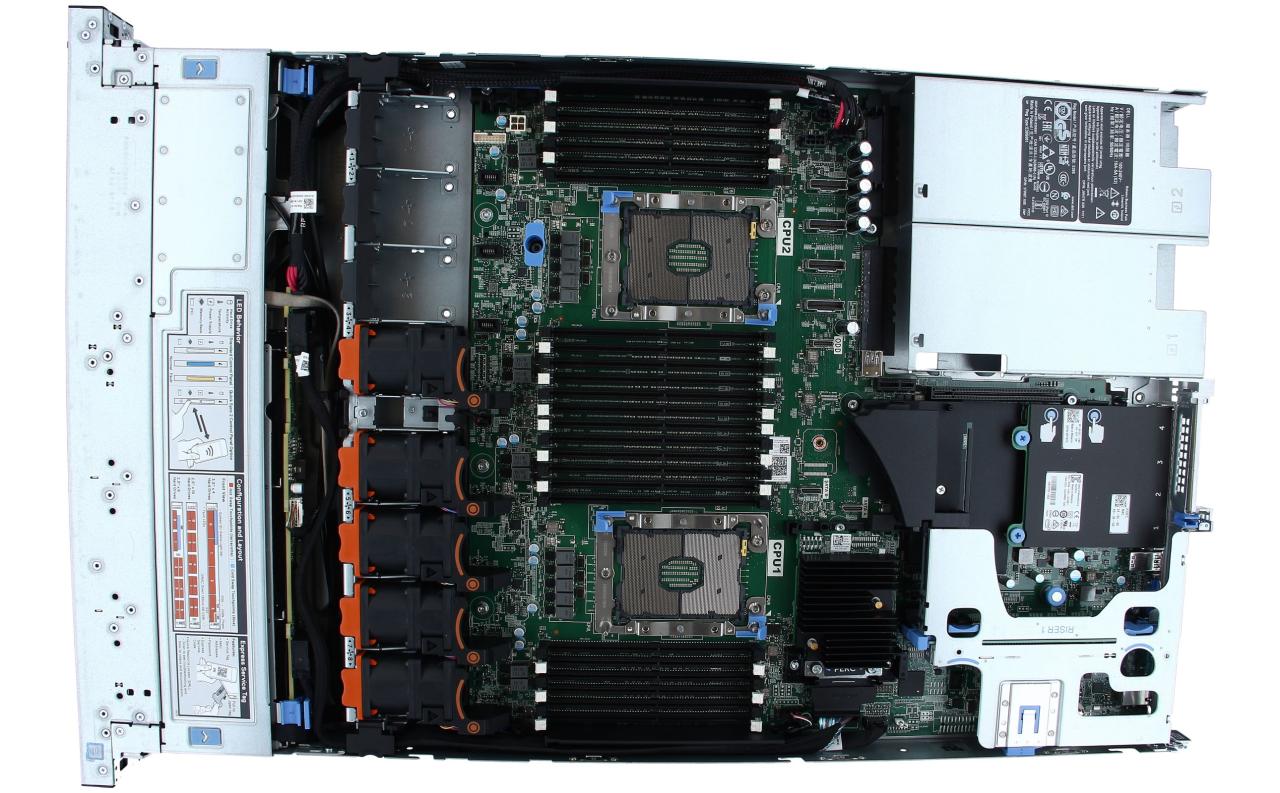
The Dell R640 server is a versatile and powerful machine that can be deployed in a wide range of applications across various industries. Its robust design, impressive performance, and scalability make it an ideal choice for demanding workloads, such as data centers, cloud computing, and enterprise applications. This section explores real-world examples of how the R640 server is used in various industries and applications, highlighting its strengths and demonstrating its adaptability.
High-Performance Computing (HPC)
The Dell R640 server’s powerful processing capabilities and high-speed memory make it a perfect choice for demanding HPC applications. Its ability to handle complex calculations and large datasets is critical in scientific research, engineering simulations, and financial modeling.
For example, a research institution might use a cluster of Dell R640 servers to run simulations for drug discovery, climate modeling, or astrophysical research. The servers’ powerful processors and high-bandwidth interconnects enable them to process massive datasets and deliver results quickly, accelerating scientific breakthroughs.
Cloud Computing
The Dell R640 server is also widely used in cloud computing environments, where it provides the foundation for delivering virtualized services and applications. Its scalability and virtualization capabilities enable cloud providers to offer flexible and cost-effective solutions to their customers.
One example is a cloud service provider that uses a large number of Dell R640 servers to host virtual machines for various customers. The servers’ virtualization capabilities allow the provider to efficiently allocate resources to different customers, ensuring optimal performance and cost efficiency. The R640’s ability to handle multiple workloads simultaneously makes it ideal for cloud environments where resource utilization is critical.
Enterprise Applications
The Dell R640 server is also a popular choice for enterprise applications, such as databases, ERP systems, and business intelligence platforms. Its high performance and reliability ensure that these critical applications run smoothly and efficiently, supporting business operations and decision-making.
For example, a large financial institution might use Dell R640 servers to host its core banking systems, which handle millions of transactions daily. The servers’ high performance and reliability are essential for ensuring the stability and security of the institution’s critical financial data. The R640’s ability to handle large databases and complex transactions makes it a reliable platform for mission-critical applications.
Challenges and Solutions, Dell r640
While the Dell R640 server is a powerful and versatile machine, its deployment in real-world environments can present challenges. These challenges often relate to factors such as:
- Power Consumption: The R640’s powerful components can consume significant power, especially when running at full capacity. This can lead to increased energy costs and potentially impact data center efficiency.
- Cooling Requirements: The R640 generates heat, which needs to be effectively managed to prevent overheating and performance degradation. This can require specialized cooling infrastructure and potentially increase operational costs.
- Security: As the R640 server often hosts critical data and applications, ensuring its security is paramount. This requires implementing robust security measures, such as firewalls, intrusion detection systems, and regular security audits.
To address these challenges, Dell provides a range of solutions, including:
- Energy-Efficient Components: Dell offers energy-efficient processors, memory modules, and other components that help reduce power consumption without sacrificing performance.
- Advanced Cooling Technologies: Dell’s R640 server is designed with advanced cooling technologies, such as air-cooled and liquid-cooled options, to manage heat effectively and optimize performance.
- Comprehensive Security Features: Dell provides comprehensive security features, including hardware-based security measures, encryption, and access control mechanisms, to protect sensitive data and applications.
By implementing these solutions, organizations can optimize their Dell R640 server deployments, ensuring efficient operation, reduced energy consumption, and enhanced security.
Comparison with Competitors
The Dell R640 server faces competition from various industry leaders, each offering unique strengths and weaknesses. Comparing the Dell R640 with its key competitors provides a comprehensive understanding of its market positioning and helps potential buyers make informed decisions.
Key Competitors and Their Strengths
The Dell R640 competes directly with servers from major players like HP, Lenovo, and Cisco. These competitors offer comparable features and performance, making it essential to analyze their strengths to understand the Dell R640’s competitive edge.
- HP ProLiant DL380 Gen10: Known for its robust build quality, extensive customization options, and comprehensive management tools. It offers a wide range of processor and memory configurations, catering to diverse workloads.
- Lenovo ThinkSystem SR650: Renowned for its energy efficiency and affordability. It provides a balance of performance and value, making it a popular choice for budget-conscious organizations.
- Cisco UCS B-Series: Emphasizes scalability and high availability. Its unified management platform and advanced networking capabilities are ideal for large-scale deployments and mission-critical applications.
Comparison Based on Technical Specifications
A detailed comparison of the Dell R640 with its competitors reveals key differences in technical specifications, highlighting the advantages and disadvantages of each server model.
| Feature | Dell R640 | HP ProLiant DL380 Gen10 | Lenovo ThinkSystem SR650 | Cisco UCS B-Series |
|---|---|---|---|---|
| Processor | Intel Xeon Scalable processors (up to 28 cores) | Intel Xeon Scalable processors (up to 28 cores) | Intel Xeon Scalable processors (up to 28 cores) | Intel Xeon Scalable processors (up to 28 cores) |
| Memory | Up to 24 DDR4 DIMMs, 3.84TB capacity | Up to 24 DDR4 DIMMs, 3.84TB capacity | Up to 24 DDR4 DIMMs, 3.84TB capacity | Up to 24 DDR4 DIMMs, 3.84TB capacity |
| Storage | Up to 24 x 2.5″ or 12 x 3.5″ drives | Up to 24 x 2.5″ or 12 x 3.5″ drives | Up to 24 x 2.5″ or 12 x 3.5″ drives | Up to 24 x 2.5″ or 12 x 3.5″ drives |
| Networking | Up to 4 x 10GbE ports | Up to 4 x 10GbE ports | Up to 4 x 10GbE ports | Up to 4 x 10GbE ports |
Performance and Scalability Considerations
While all competitors offer similar processor and memory options, subtle differences in architecture and optimization can impact performance. The Dell R640, with its focus on efficiency and scalability, generally delivers strong performance in virtualized environments and demanding workloads.
Factors Influencing Server Choice
The choice between different server models depends on several factors, including budget, workload requirements, and organizational needs.
- Budget: Lenovo ThinkSystem SR650 offers a cost-effective option for budget-conscious organizations.
- Workload Requirements: For demanding workloads, the Dell R640’s focus on performance and scalability might be preferable.
- Organizational Needs: Cisco UCS B-Series excels in large-scale deployments and high-availability environments.
Future Trends and Innovations
The server market is constantly evolving, driven by advancements in technology, changing business needs, and emerging trends. The Dell R640 server, a powerful and versatile platform, will need to adapt to these changes to remain competitive and relevant. This section explores some key future trends and how they might impact the evolution of the Dell R640 server.
Impact of Artificial Intelligence (AI)
The rapid growth of AI is transforming various industries, driving the need for more powerful and efficient computing resources. AI workloads, including machine learning and deep learning, demand significant processing power, memory, and storage capacity. The Dell R640 server can evolve to meet these demands by incorporating features such as:
- Enhanced Processor Performance: The server can be equipped with the latest generation of Intel Xeon Scalable processors, offering increased core counts and higher clock speeds to handle the computationally intensive tasks of AI workloads.
- Accelerated Computing: The Dell R640 server can integrate specialized hardware accelerators, such as GPUs (Graphics Processing Units) or FPGAs (Field-Programmable Gate Arrays), to accelerate AI model training and inference processes. This can significantly improve the performance and efficiency of AI applications.
- Optimized Memory and Storage: AI workloads require large amounts of memory and storage to handle massive datasets and model parameters. The Dell R640 server can be configured with high-capacity memory modules and high-performance storage solutions to meet these demands.
Cost and Value Analysis
The Dell R640 server offers a compelling combination of performance, scalability, and reliability, making it a strong contender for various enterprise workloads. However, it’s essential to evaluate the cost of acquisition and maintenance alongside the potential benefits to determine if it’s the right investment for your specific needs. This section delves into the cost and value analysis of the Dell R640 server, examining its pricing structure, operational expenses, and the potential return on investment (ROI) across different use cases.
Cost of Acquisition and Maintenance
The cost of acquiring a Dell R640 server is influenced by several factors, including the specific configuration, the number of servers purchased, and any additional services or support contracts. The base price for a Dell R640 server typically starts around $2,000, but this can vary significantly depending on the chosen components and features.
Here’s a breakdown of the key cost components:
- Server Hardware: This includes the base server chassis, processors, memory, storage, and network interfaces. The cost of these components varies based on the performance and capacity requirements.
- Operating System: The operating system, such as Windows Server or Red Hat Enterprise Linux, adds to the initial cost. Licensing fees vary based on the chosen operating system and the number of server cores.
- Software: Additional software applications, such as virtualization software or database management systems, contribute to the overall cost. The cost of these applications depends on the specific software and the number of licenses required.
- Support and Services: Dell offers various support and service contracts, including hardware warranty, software support, and proactive maintenance services. These contracts add to the ongoing costs.
- Power and Cooling: The power consumption of the Dell R640 server, along with the associated cooling infrastructure, can add to operational expenses. The cost of electricity and cooling can vary based on location and energy efficiency.
- Staffing: Managing and maintaining the server infrastructure requires IT personnel. The cost of staffing can vary based on the size of the IT team and their level of expertise.
Return on Investment (ROI) Analysis
The return on investment (ROI) for a Dell R640 server depends on the specific use case and deployment scenario. Here are some key factors that influence ROI:
- Workload Optimization: The server’s performance and scalability can significantly improve application performance and efficiency, leading to increased productivity and reduced operational costs.
- Virtualization and Consolidation: The Dell R640 server supports virtualization technologies, enabling consolidation of multiple workloads onto fewer physical servers. This can reduce hardware costs and simplify management.
- High Availability and Disaster Recovery: The server’s built-in features for high availability and disaster recovery can minimize downtime and data loss, protecting business continuity and revenue.
- Energy Efficiency: The Dell R640 server incorporates energy-efficient features that can reduce power consumption and operational costs.
Value Proposition of the Dell R640 Server
The Dell R640 server offers a compelling value proposition for organizations seeking a reliable, scalable, and cost-effective server solution. Its key strengths include:
- High Performance: The server’s powerful processors, ample memory, and fast storage deliver high performance for demanding workloads.
- Scalability: The Dell R640 server supports various configurations, allowing organizations to scale their infrastructure as their needs grow.
- Reliability: Dell’s reputation for quality and reliability ensures that the R640 server can handle demanding workloads with minimal downtime.
- Management and Administration: The server’s integrated management tools simplify deployment, configuration, and ongoing management.
- Cost-Effectiveness: The Dell R640 server offers a balance of performance, features, and affordability, making it a cost-effective solution for various workloads.
Final Conclusion
The Dell R640 server empowers businesses to achieve their goals by delivering exceptional performance, scalability, and reliability. Its advanced features and comprehensive management tools make it a valuable asset for any IT infrastructure. By leveraging the Dell R640, organizations can streamline operations, optimize resource utilization, and unlock new possibilities for growth and innovation.
The Dell R640 is a powerful server, capable of handling complex workloads. It’s a great choice for businesses that need reliable performance and scalability. While the R640 is a serious piece of hardware, it’s fun to think about how its components are assembled.
It’s a bit like a DIY project, like creating your own DIY shrinky dinks , but with a lot more precision and complexity. The Dell R640 is a testament to the ingenuity of engineers who design and build these powerful machines.


